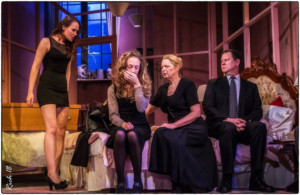 Reviewed by Barry Lenny, Thursday 2nd August 2018.
Reviewed by Barry Lenny, Thursday 2nd August 2018.
Shelagh Stephenson's play,
The Memory of Water, had its premiere at
The Hampstead Theatre in London in 1996 and won the 2000
Laurence Olivier Award for Best New Comedy. The play was last performed here when the State Theatre Company staged a production in August 2009. Now it is the turn of the St. Jude's Players to reunite this extremely dysfunctional family, with director, Geoff Brittain, at the helm.
Vi has died, and her three daughters, Teresa, Mary, and Catherine, have come together for the funeral. The whole play takes place in their mother's bedroom, where they sort out her old dresses ready either for the dustbin, or to send to a charity. At the start, only Teresa and Mary have arrived. They are both waiting for Catherine, Teresa is waiting for her husband, Frank, and Mary is waiting for Mike, her married lover of five years. When Catherine arrives, we discover that she is waiting for her latest in a long line of lovers, Xavier, to telephone to tell her that he is on his way to join her.
As they bicker we begin to see the theme developing, that all three have shared memories, but they never agree on which version of each memory is true, or even whose memory it is, occasionally claiming each other's experiences as their own.
It is not unusual for people to talk aloud to deceased family members and imagine what they might say in response. At the very beginning of the play, Mary is doing just that, but we get to see and hear her late mother. The two have further conversations during the play. Dysfunctionality seems to run in this family. I was reminded of the Philip Larkin poem, This Be The Verse. Everybody seems to be playing the 'poor me' game (
Eric Berne, 1964, Games People Play: The Psychology of Human Relationships), competing to be seen as the one who has been most hard done by.
Teresa is the eldest of the daughters, on her second marriage and running a homoeopathic herbal supplement business with her husband, Frank. She is permanently wound up as tight as a drum, making mountains out of molehills. Mother isn't even in the ground yet, but she wants to get on with clearing the house, and badgers the others into, eventually, going through the contents of the wardrobe. Poor Frank, though, hates being sent off all over Europe trying to sell their products in bulk as he has no belief at all in her pills and potions. He eventually announces that he has had enough and what he really wants to do is buy a pub.
Teresa is played strongly by
Jenny Allen as a humourless neurotic, unable to offer even a hint of a smile, until Catherine starts passing around the marijuana, Mary shares her bottle of whisky and they all start trying on their mother's old outfits.
Mary is the middle daughter, a neurologist, currently treating, and obsessed with her treatment of an amnesiac patient. She has brought texts to study to help with her treatment, but that is no more inappropriate that anything the other sisters are doing.
Cheryl Douglas plays Mary, in one more of her beautifully constructed characterisations, seemingly in control, but hitting the whisky bottle without wasting time by using a glass. Douglas finds and embraces a dryness in the comedy adding a cynical edge to her character.
Mike has claimed that his wife has ME, or myalgic encephalomyelitis, also known as chronic fatigue syndrome, and he uses this as an excuse for being unable to leave her for Mary. Unfortunately for Mike, Mary has seen a magazine containing pictures of him and his wife, out and about in the social whirl, and she clearly shows no sign of lethargy, and she is ready for a confrontation.
Catherine is the youngest, at 25, broke, but still loading more debt onto her already overloaded credit cards. She arrives late, held up on a shopping spree, attested to by the numerous bags that she carries. She is focussed on, or obsessed with, an expected call from the absent Xavier
Laura Antoniazzi is hilarious as the over the top, inappropriately dressed for a funeral, attention seeking, weed smoking, Catherine, lurching from one burst of histrionics to the next, but getting no bites from her sisters who have seen it all before.
Madeleine Marin, as Vi, gives us a woman who is all style but not too much substance, not good attributes for a mother.
Mark Healy and
Stuart Pearce, as Mike and Frank, provide plenty of support to the three sisters who, in the end, don't seem to be doing any better in life than Chekhov's Three Sisters, but they do provide a lot more laughs.
Ole Wiebkin has come up with another of his elaborate and highly detailed sets to represent the mother's bedroom in her dilapidated home on a cliff by the sea, the sea that is getting progressively closer and is likely to take the house with it. The lighting is in the good hands of Richard Parkhill, who adds atmosphere to Mary's encounters with Vi.
There are plenty of laughs amid all of the serious relationship disasters in this enetertaining evening of theatre, so head down to Brighton for a fun night out.
Reader Reviews
To post a comment, you must
register and
login.

 Reviewed by Barry Lenny, Thursday 2nd August 2018.
Reviewed by Barry Lenny, Thursday 2nd August 2018.
 Reviewed by Barry Lenny, Thursday 2nd August 2018.
Reviewed by Barry Lenny, Thursday 2nd August 2018.